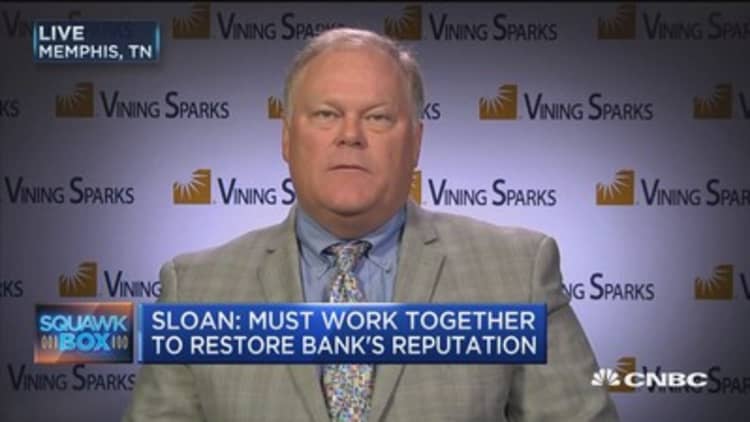
John Stumpf's decision to retire eases only one headache for Wells Fargo and the banking industry, with many more to come.
The scandal over illegal cross-selling at Wells serves as a reminder of how far banks have yet to go to recover the public trust they lost after the 2008 financial crisis.
As for Wells individually, the departure of its much-vilified CEO helps the bank rehabilitate its image, at least in front of investors if not the general public. But questions will persist about what is next on the regulatory horizon.
"Everyone wanted to have someone's head on a plate and now they do," said Brian Kleinhanzl, an analyst at financial services firm Keefe, Bruyette & Woods. "Now that he's gone, you go on to the next discussion."
Three issues will be taking center stage not only for Wells Fargo but also the $16 trillion U.S. banking industry: whether to start breaking up the big Wall Street institutions; separating the roles of chairman and CEO; and corporate governance rules that allow a bank chief executive who's under fire to walk away relatively unscathed outside of reputational damage.
Of the three, separating the chairman and CEO roles is the easiest.
There already has been pressure to strip JPMorgan Chase chief Jamie Dimon of the roles, though the move ultimately was unsuccessful. However, the Stumpf case could provide additional momentum.
"That is a great idea. I think we'll see additional pressure on all the banks to do that," said Erik Oja, equity analyst at CFRA. "Most U.S. banks do combine the two positions, which is rare. If you look globally, you see there's a strict separation of chairman and CEO."
Breaking up the banks, though, isn't as simple as breaking up job titles.
Though populists have been calling for dicing up the Wall Street power brokers since the crisis, there's been no progress made in that regard. While Dodd-Frank regulations have restricted how banks can operate, the big four — JPMorgan, Wells Fargo, Bank of America and Citigroup — have gotten only bigger and now control nearly half the assets of the entire U.S. banking system.
The loudest congressional voice in the anti-Wall Street movement has been Massachusetts Democrat Sen. Elizabeth Warren, who went on a Twitter tirade Wednesday evening after the Stumpf announcement.
She complained that he was able "to oversee a massive fraud & simply walk away to enjoy his millions in retirement."
Reining in executive behavior may be a more achievable goal than taking down big banks, despite the negative publicity from the Wells scandal.
"The corporate governance aspects of it are much more doable," Oja said. "I don't expect Wells Fargo to be broken up, but I do expect a lot of loud rhetoric to come from" Congress.


